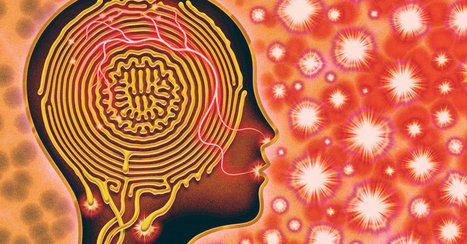Like a key, SARS-CoV-2—the virus that causes coronavirus disease 2019 (COVID-19) - attaches to specific molecules on the host cell surface, opening gateways into the cell interior. Viral entry into host cells triggers a prodigious immune response. Much of this battle is waged within the lungs, which explains why many patients hospitalized with COVID-19 have severe respiratory symptoms. Respiratory symptoms, however, are only part of the story. Increasing evidence points toward blood vessel inflammation as having a crucial impact on the severity of COVID-19. In addition, anywhere from 30 to 80 percent of patients experience neurological symptoms, including dizziness, headache, nausea, and loss of concentration. These symptoms suggest that SARS-CoV-2 also affects cells of the central nervous system. While there is no evidence yet that the virus invades the brain, new work by scientists at the Lewis Katz School of Medicine at Temple University shows that the spike proteins that extrude from SARS-CoV-2 promote inflammatory responses on the endothelial cells that form the blood-brain barrier. The study, published in the December print issue of the journal Neurobiology of Disease, is the first to show that SARS-CoV-2 spike proteins can cause this barrier to become "leaky," potentially disrupting the delicate neural networks within the brain.
"Previous studies have shown that SARS-CoV-2 infects host cells by using its spike proteins to bind to the angiotensin converting enzyme 2 (ACE2) on the host cell surface," explained Servio H. Ramirez, Ph.D., Professor of Pathology and Laboratory Medicine at the Lewis Katz School of Medicine at Temple University and principal investigator on the new study. ACE2 is expressed on endothelial cells, which form the inner lining of blood vessels, and serves a central role in mediating different functions of the cardiovascular system. According to Dr. Ramirez, "since ACE2 is a major binding target for SARS-CoV-2 in the lungs and vasculature of other organs in the body, tissues that are behind the vasculature, that receive blood from affected vessels, are at risk of damage from the virus." It has been unclear, however, whether ACE2 is also present in the brain vasculature or whether its expression changes in health conditions that worsen COVID-19, such as high blood pressure (hypertension). To find out, the team began by examining postmortem human brain tissue for vascular ACE2 expression, using tissues from individuals without underlying health conditions and from individuals in whom hypertension and dementia had been established. Analyses showed that ACE2 is in fact expressed throughout blood vessels in the frontal cortex of the brain and is significantly increased in the brain vasculature of persons with a history of hypertension or dementia.
The researchers then investigated the effects of the SARS-CoV-2 spike protein on brain endothelial cells in cell culture models. Introduction of the spike protein, particularly a portion designated subunit 1, produced substantial changes in endothelial barrier function that led to declines in barrier integrity. The researchers also uncovered evidence that subunit 2 of the SARS-CoV-2 spike protein can directly impact blood-brain barrier function. "This is of importance because unlike subunit 1, subunit 2 of the spike protein doesn't bind to ACE2, meaning that a breach to the blood-brain barrier could occur in a manner that is independent of ACE2," explained postdoctoral fellow and first author on the new report Tetyana P. Buzhdygan, Ph.D. Dr. Ramirez's team further investigated the effects of SARS-CoV-2 spike proteins on tissue-engineered microfluidic constructs designed to mimic a human brain capillary. "The tissue-engineered microfluidic models allow recapitulation of the 3-D cyto-architecture and mechanical forces caused by fluid movement, which the vasculature is continuously exposed to," said Allison M. Andrews, Ph.D., Assistant Professor in the Department of Pathology & Laboratory Medicine at LKSOM and a co-author on the report. Experiments showed that binding of spike protein subunit 1 increased barrier permeability in the engineered vessel-like constructs. "Our findings support the implication that SARS-CoV-2, or its shed spike proteins circulating in the blood stream, could cause destabilization of the blood-brain barrier in key brain regions," Dr. Ramirez said. "Altered function of this barrier, which normally keeps harmful agents out of the brain, greatly increases the possibility of neuroinvasion by this pathogen, offering an explanation for the neurological manifestations experienced by COVID-19 patients."...
Original study published in Neurobiology of Disease:
https://doi.org/10.1016/j.nbd.2020.105131



 Your new post is loading...
Your new post is loading...









